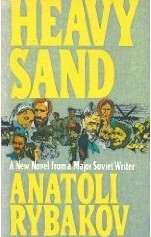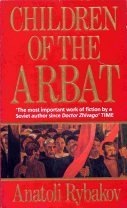
Heavy Sand
Book Description
A struggle for survival unfolds in the unforgiving terrain of post-war Russia, where loyalty battles with betrayal and hope clashes with despair. As the characters navigate shifting alliances and the relentless sands of a harsh reality, every decision ripples with consequences that could shatter their fragile bonds. Amidst the chaos, a haunting past threatens to resurface, testing the limits of love and friendship. Suspense crackles in the air as they grapple with haunting memories and the crushing weight of their choices. Will they rise above the heavy sand that seeks to bury them, or will they be consumed by the darkness?
Quick Book Summary
"Heavy Sand" by Anatoli Rybakov is a deeply moving saga of a Jewish family living in Ukraine during the Soviet era, spanning from the early 20th century through World War II. At its heart is the story of the Ivanovsky family, whose members struggle against the brutalities of anti-Semitism, the ravages of war, and the oppressive Soviet regime. As Nazi occupation brings devastation and betrayal to their community, the family and its neighbors must navigate harrowing choices and shifting allegiances. Love and resilience are tested as they grapple with the horrors of the Holocaust and the realities of life under occupation. Against a backdrop of historical upheaval, "Heavy Sand" explores themes of survival, the strength of familial bonds, and the enduring hope that persists even in the darkest moments.
Summary of Key Ideas
Table of Contents
Family and Survival Amid Turmoil
Set in a Ukrainian town, "Heavy Sand" chronicles several decades of the Ivanovsky family—a close-knit Jewish household—as they are swept into the cataclysms of 20th-century history. Beginning with the marriage of Boris Ivanovsky and Rachel, a German-Jewish immigrant, the narrative follows their integration into Russian society and the growth of their family against a backdrop of political upheaval, pogroms, and the mounting pressures of Stalinist rule. The daily rhythms of life, religion, and tradition intertwine, rooting the novel in the lived experience of pre-war Soviet Jewry.
The Weight of Memory and History
As war approaches, the family is forced to confront encroaching danger. The Nazi invasion brings unimaginable hardship, splitting families and community ties. Some members face deportation or join the Red Army, while others remain, enduring the occupation’s brutality. The Ivanovskys become emblematic of both communal resilience and individuals forced into morally ambiguous decisions. The narrative moves between the perspectives of various family members, deepening the exploration of loyalty, betrayal, and the cost of survival.
Loyalty, Betrayal, and Moral Ambiguity
Throughout Nazi occupation, the Ivanovskys find themselves trapped in a ghetto, where starvation, violence, and betrayal are daily realities. Bonds of friendship and love are tested, but new alliances form among those determined to resist. The characters wrestle with impossible choices—whether to risk everything for escape or wait helplessly. Sand, as a symbol, underscores the oppressive weight pressing down on them and the possibility of being erased by history. Yet, flickers of solidarity and hope persist, as the family clings to memory and each other.
Love and Sacrifice in Times of War
Jewish identity emerges as both a source of pride and a cause for persecution. The Ivanovskys’ struggle is mirrored by the wider Jewish community’s fight for survival and dignity. Amidst horror, individuals choose either to capitulate or to resist. The family’s attempts—successful or tragic—to defy the Nazis reflect a broader narrative of resistance and the unbreakable spirit of those targeted for annihilation. The novel does not shy from showing the ethical complexity of resistance under occupation.
Jewish Identity and Resistance
Ultimately, "Heavy Sand" is a meditation on endurance and the legacy of trauma. In the aftermath of war, survivors are left to mourn their losses and face a world forever changed by violence and betrayal. Through the Ivanovsky family’s journey, Rybakov examines the power of memory to shape identity, the ways love and sacrifice persist in darkness, and the profound costs—and rare triumphs—of survival.
Download This Summary
Get a free PDF of this summary instantly — no email required.





